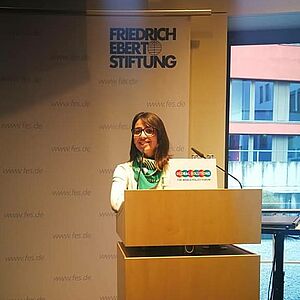Chile and Climate Change: Thinking global, acting local
Camila Carrasco-Hidalgo, Director Foundation La Alameda, Chile is the author of moving paper on climate change in Chile. Her work with Friedrich-Ebert-Stiftung Mexico, FES Transformation, and Foundation La Alameda, is shining a new light on the local voices and experiences across Chile, affected by climate change. In this article, we ask her to introduce her work (currently only available in Spanish) and discuss some of her findings.
This book is the fruit of the collective efforts of many. The Foundation was tasked to investigate and understand the numerous climate related challenges currently facing Chile. However, as is evident by the current global rhetoric on this issue—climate change still remains an abstruse concept for many. Without a more intimate understanding and connection to the effects on their surrounding environment, many simply turn away from participating in the discourse. It was for this specific reason that a core gathering of local scholars, politicians and civil servants began to take different, more grassroots approach to this issue.
As it stands, the damage being done to the environment and local ecosystems is irrefutable—with more and more vulnerable people feeling its effects. The development of heterogeneous industrial systems and frameworks, both locally and globally, have greatly impacted biodiversity. Understanding this then, it is irresponsible to even approach the design or method of public policies without including an environmental dimension. In fact, our responsibility should be not only to local initiatives but also to thinking and working towards a more global holistic solution. However, in a rush to ‘solve’ the issues impacting our climate, we often overlook the realities for local and indigenous people. A reality which, simply put needs to understand that collaborative participation, transparency, accountability and governance must be a hallmark of the transformation together with civil society and local stakeholders.
Natural disasters, brought about by an ever-changing climate change is widening the economic, political and social inequality for the inhabitants of the peripheral areas of Chile. Chile (and Latin America) are facing the effects of an environmental reality that has been caused by the excessive use (extractivism) of natural resources. While we don’t have all the answers for the uphill struggles that face those who’s reality is steadily shifting, this book and our efforts surrounding it can give a voice and shed light on the complexities of a difficult situation. Combining great minds from the world of academia, politics and civil society, to research, discuss, and elucidate local realities, our combined efforts may yet arrive at a solution.
The book is not born out of large international conferences or seminars but of the national, local reality. If its findings and the words it holds are made known, it can be an example for other places in Latin America and the world. Our objective was to link with organizations and stakeholders that work to find solutions for the climate crisis. We use the term: ”think globally, act locally”. Each chapter was a thorough investigation into the minutiae of local detail and analysis, but ultimately contributes to a bigger picture.
The book is divided into the following sections. Firstly, Álvaro Calix wrote the introduction of book and he talked about the project “Social and ecological transformation for Latin America” of Fiedrich Ebert Foundation. The focus of this work is to show that we have the possible alternative of overcoming our over dependancy on natural resources and can achieve another development alternative. Secondly, we diagnose the various issues and challenges of public policies, governance, institutions and legislation to mitigate the effects of climate change in Chile. This was possible thanks to the authors: Álvaro Calix (who wrote the introduction), Rodrigo Jiliberto, Camila Carrasco-Hidalgo, Sebastian Carrasco , Antoine Maillet and Alfonso De Urresti, Senator of the republic of Chile. Thirdly, we explore several current sustainability initiatives by local governments. These are real examples of efforts around climate change and show that it can be achieved by local governments through participation, education and the transfer of resources. Evelyn Stevens and Claudio Castro, Mayor of Renca, have kindly contributed with their experiences.
Renca is a perfect example of how effective local actions can be. By taking a more collaborative approach with both citizens, and local and international organizations, the y are taking their stand. The Asociación Chilena de Municipalidades has formed a group to work on climate change, social mobilizations, and are tackling the conflicts that have been caused by deregulated industry which produces pollution and affectation both biodiversity and people's health.
The book is not a sufficient report to discuss how to mitigate the consequences of climate change, but it is necessary to have the knowledge and awareness that Chile is a country vulnerable to its effects. In this book we show how impactful coherent and strong institutions, robust state policies, empowerment of civil society and organizations are needed to effectively follow the path of sustainability.
We hope that our work in this book, once read, inspires others to also contribute their findings. Our collective voices, experiencing, and understanding—combined—is a powerful tool in understanding how we should go about reversing the damage done to our climate.
###
Chile y el cambio climático: pensar globalmente, actuar localmente’ by Camila Carrasco-Hidalgo, with Friedrich-Ebert-Stiftung Mexico, FES Transformation, Foundation La Alameda, is currently available in the FES Library (in Spanish).
About FES Connect
Connecting people, in the spirit of social democracy, we source and share content in English from the German and international network of the Friedrich-Ebert-Stiftung.





